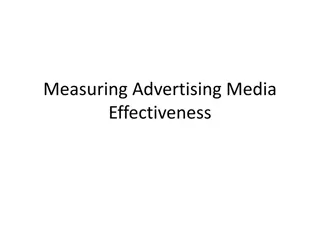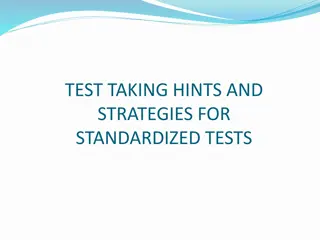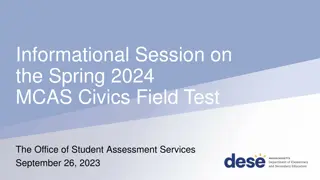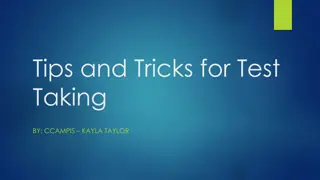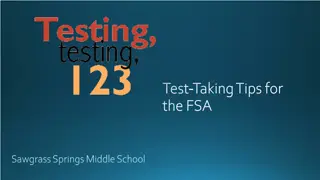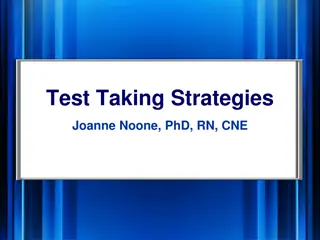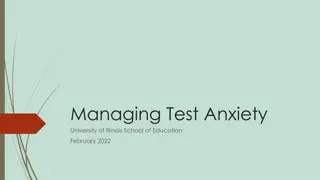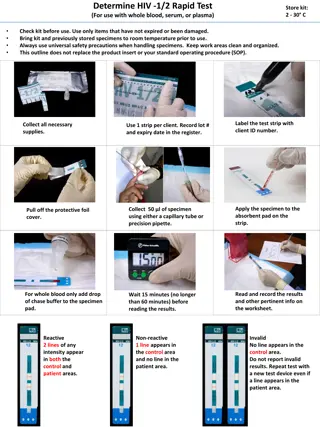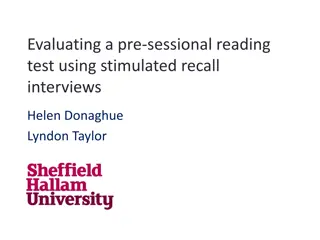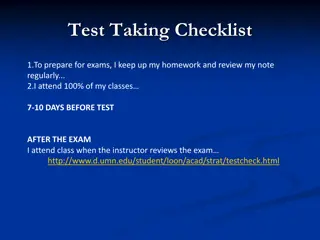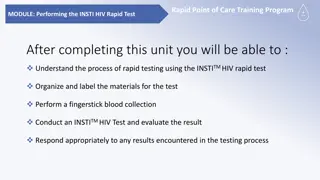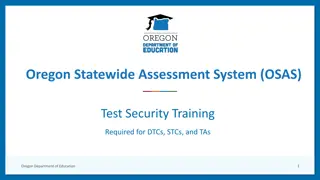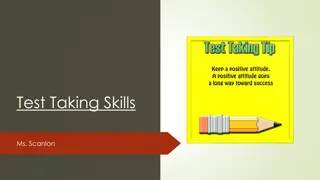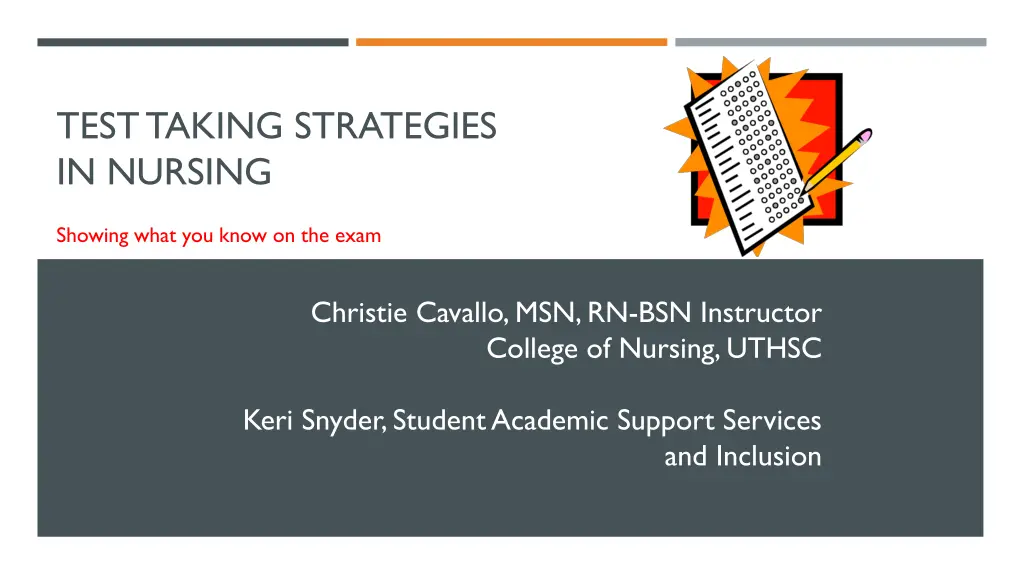
Effective Test Taking Strategies in Nursing Education
Enhance your test-taking skills in nursing through strategies for managing time, reducing anxiety, improving reading rate and vocabulary, and maintaining emotional and physical health. Adjust your study techniques to excel in your environment and optimize your learning experience.
Download Presentation

Please find below an Image/Link to download the presentation.
The content on the website is provided AS IS for your information and personal use only. It may not be sold, licensed, or shared on other websites without obtaining consent from the author. If you encounter any issues during the download, it is possible that the publisher has removed the file from their server.
You are allowed to download the files provided on this website for personal or commercial use, subject to the condition that they are used lawfully. All files are the property of their respective owners.
The content on the website is provided AS IS for your information and personal use only. It may not be sold, licensed, or shared on other websites without obtaining consent from the author.
E N D
Presentation Transcript
TEST TAKING STRATEGIES IN NURSING Showing what you know on the exam Christie Cavallo, MSN, RN-BSN Instructor College of Nursing, UTHSC Keri Snyder, Student Academic Support Services and Inclusion
FACTORS THAT CAN IMPACT LEARNING Knowledge Review strategies Reading rate Anxiety Time management Test-taking strategies & pace Physical, emotional health
READING RATE & VOCABULARY Vocabulary Enhancers Reading Rate SASSI computer lab Examples, definitions, activities Learning resources and speed reader programs Vocabulary Builder Acceleread Spreeder Magoosh https://www.lumosity.com
TIME MANAGEMENT Remember: There isn t time to do EVERYTHING Keep a running list of things to review on the weekend What s most important? Be selfish with your time Be flexible but realistic Unexpected things happen Is it a good use of your time? Is it worth it? Give it a chance Try not to multitask too much Go through the material that you can get through the fastest Set time limits and stick to them Move on even if you don t accomplish everything
ANXIETY, EMOTIONAL, PHYSICAL HEALTH Eating, sleeping, exercise Your support network Meet with an Educational Specialist Talk to someone Counseling Services Try new strategies University Health Services Think out loud Student Assistance Program (SAP) JED (online mental health resources)
REVIEW STRATEGIES Yesterday Review what you covered yesterday Today Review what you covered today Tomorrow Preview what you re going to cover tomorrow
STRATEGIES While the strategies that got you here worked, they may need to be adjusted to fit this environment. Test taking, time management, study skills, etc. The lightweight day pack that you trained with is a walk in the park compared to the 50lb pack now on your back. Be open to making adjustments that will improve your ability to thrive in this environment.
PAST, PRESENT, FUTURE Past What worked before? Memorization Reviewing Notecards Only using 1 resource Not opening a book Last minute/not studying Old Tricks Longest Answer is correct Find an word in the answers that matches the stem Don t choose A or 1 often, it s not usually correct Choose All of the above or None of the above A positive choice is more likely than a negative choice Come up with the answer in your head before you answer NOPE, Doesn t work in nursing questions!!!
PAST, PRESENT, FUTURE Present What s working now? Are the same approaches working? How do you know? Future What can you do to go higher? Try a new approach Practice questions What do you need to change? Have you been doing practice questions? Fine tuning Time management Asking the experts SASSI, CON Learning Navigator, Faculty Tutors, Peers
ANATOMY OF A NURSING QUESTION Stem-Question Distractors-Answers NCLEX is Multiple choice Timed Application and analysis .not regurgitation of memorization
TIP #1 Avoid asking forbidden words Well, what if
EXAMPLE QUESTION A hospitalized patient has a fever of 102.4 F orally and is exhibiting chills, warm, flushed skin and lethargy. Which action by the nurse is correct? 1. Administer acetaminophen (Tylenol) 500 mg x 2 tablets 2. Apply a warm, dry cloth to patient's axillary areas 3. Call the patient s family to the hospital 4. Ask the patient if they have had anything to eat
TIP #2 Focus first on only the information in the question (stem) What is the question asking???
EXAMPLE QUESTION A patient was driving the wrong way on a one way street when he hit a car going 60 mph. He has a comminuted fracture to his right tibia and fibia. Surgery was preformed by Dr. Bones on July 23, 2018. He has requested a hamburger for lunch. The nurse is teaching a client in skeletal leg traction about measures to increase bed mobility. Which item would be most helpful for this patient? 1. Crutches 2. Fracture bedpan 3. Overhead trapeze 4. Walker
TIP #3 Look for strategic words Initial, first, priority, (all answers are correct, one is first)
EXAMPLE QUESTION The nurse is caring for a patient with a diagnosis of heart failure who suddenly complains of shortness of breath. The nurse should take which immediate action? 1. Administer oxygen to the client 2. Elevates the head of the patient s bed 3. Calls the health care provider (HCP) If experiencing anxiety or are thrown off, focus on the first word. It helps get you grounded. Administer Elevates Calls Prepares 4. Prepares to administer furosemide (Lasix)
TIP #4 In multiple choice questions that are select all that apply Read every choice before answering Ask if each option is an answer to what the question is asking (basically a knowledge question)
EXAMPLE QUESTION The nurse is caring for a client who just returned from the recovery room after undergoing abdominal surgery. Which symptom(s) indicate hypovolemia (select all that apply)? Lethargy 1. Increased pulse rate 2. Increase urinary output 3. Fever 4. Hypotension 5.
TIP #5 When choosing an answer First eliminate the wrong answers
EXAMPLE QUESTION The nurse provides medication instructions to a patient about digoxin (Lanoxin). Which statement by the patient indicates an understanding of the adverse effects? 1. Blurred vision is expected. 2. If I am nauseated, I should just drink liquids. 3. This medication may cause headache and weakness. 4. I should check my pulse before I take the medication.
REVIEW OF TEST TAKING STRATEGIES Cover the answers Read the LAST sentence first, if needed read the last two sentences. What is the question asking? Look for strategic words Predict the answer OR brainstorm what you do know based on what you know is incorrect based on the question? Don t get hung up on words that you do not know
QUESTION ANALYSIS- Think about why a question was missed Misread Gave up too quickly Words skipped, words read incorrectly (ie. Independent/dependent) If you spent one more minute on the question would you have gotten it correct? Words in the question that you didn t know Did not know the information needed to problem solve Misinterpreted Knowledge deficits? Did you go to what ifs ? Are you changing your answer? Thought about extraneous information and not the question Missed a strategic word
STRATEGIC LEARNING Desired outcome: Your grade matching the amount of effort that you put into your studying. Be strategic in your studying/time management Do what s worked and integrate different strategies Use practice questions Seek assistance Long-term learning; building upon knowledge
PRACTICE QUESTIONS- Why are they useful? Use them early, not later Identify gaps in knowledge Provides practice in applying, analyzing, and evaluating problems Template for integrating the material and thinking like a nurse Makes the material stick
SELF EVALUATION- Strategies to be mindful of before you begin your exam Be a friend Fear is contagious! Keep pace Limited time on each question Make a guess and move on Before the test Do 3-5 questions that you know the morning of as a warm up (not material that you are unsure of) Practice timing yourself Go with your gut You know this! What is your intuition? After your first assessment Reflect on what went well Don t change your answer unless you can bet on it Practice questions can help build confidence If you did not finish on time, felt rushed, didn t sleep the night before reach out to resources early so that you can strategically approach the next exam Don t forget to breathe! Helps with anxiety
NEED HELP? Counseling Services Care Navigator SASSI SASSI 8 South Dunlap Street, Room BB9 Memphis, TN 38163 SASSI 901-448-5056 Or UHS 910 Madison, 9th Floor Or SAP 1-800-327-2255 Contact Rachel Bolick: uthsc.edu/care-concern careteam@uthsc.edu (901)448-2344 SASSI GEB BB9 uthsc.edu/care-team 8 South Dunlap Street, Room BB9 Memphis, TN 38163 SASSI 901-448-5056 sassi@uthsc.edu Schedule an appointment online uthsc.edu/sassi Schedule an appointment online uthsc.edu/sassi After Hours Mental Health Emergency - (901) 541-5654 or Suicide Prevention Lifelines: 1-800-273-8255 (TALK) Here you can speak to a counselor about mental health issues or share a care concern after hours
REFERENCES Silvestri, L. A. (2014). Saunder s comprehensive review for the NCLEX-RN examination. (6th ed). St. Louis, MO:Elsevier

